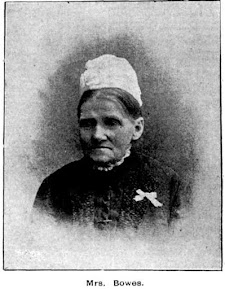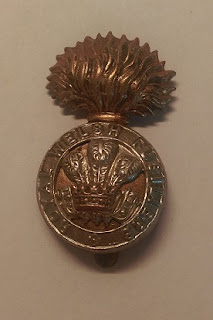From farm hand to owner of a milling empire!
I mentioned in last week's
blog that this week I would steer clear of a tragedy and include a story of
inspiration. This man's name is seen on an old building I pass every time I
take the train to Sydney CBD.
FRANCIS CRAGO
Francis was born in January
1848 in Liskeard, Cornwall, England, the third son of four of William Crago and
Elizabeth (nee Tamblyn). His only two sisters had died in infancy prior to his
birth. The family were of farming stock and the sons followed their father in
that field. All were educated and could read and write. His eldest brother,
Petherick, immigrated to Australia with his new wife, Ann in June 1858 just a
few months after their marriage. He did so to undertake employment offered by
the Government in Yass.
Petherick could see the opportunities
for his family in this colony which was rapidly expanding due to the gold rush
and the industrial revolution and duly sponsored the rest of his family to come
to Australia. They arrived in Sydney on board the "Hornet" in January
1865, the heat would have been a rude awakening to them all.
Initially they undertook
farming in the Yass area, but Petherick and Francis commenced as labourers in
the growing flour milling business but could see the potential as a flourishing
industry. Francis worked his way up to become the Manager at Barbers Mill in
Yass and he married Mary Ann Colvin, a Yass resident who originated from
Ireland in 1877. Francis afterwards started up a similar business in Branxton
close to Maitland and then on to Singleton in 1882.
Francis were considered to
be a great judge of wheat and in 1883 saw the opportunity to move to Bathurst
and bought the Hibernian Mill that year.
Two separate companies were
formed with Petherick in charge of P T Crago in Yass and F Crago and Sons in
Bathurst. In time the Yass business closed.
Francis was blessed with
foresight and great business acumen. He embraced new technology in the milling
business such as steel roller milling machines to hasten activities. He also
saw how the expansion of the railways would benefit his business by getting his
product to the large markets of Newcastle and Sydney quickly. Not only did he
take up these new opportunities but also experimented with new wheat strains to
better deal with the climate and produce more yield.
He was the man in the right
place at the right time to see the rapid changes in just a few years in the way
that wheat was manufactured. Francis immersed himself in the community of
Bathurst and was soon an Alderman on the local council. He was the Mayor from
January 1901 for a year.
It soon became apparent that
Bathurst was too small for Francis' plans, and he relocated to Sydney, building
the Newtown Mill in the early 1900's, becoming known as Federal Flour Mills.
The Crago's set up residence in the nearby semi-rural area of Strathfield on a
large estate and became part of the elite of the area. The family were to
become enmeshed in the Hoskins (steel manufacturer) family and that will be the
subject of another blog in due course.
Francis Crago died
unexpectedly in his 60th year at his Strathfield residence on the evening of
the 3rd of December 1907 after having spent the day tending to his beloved rose
garden. He left a widow and nine children to mourn his loss.
The family plot in the old Anglican area near Necropolis Drive contains Francis, his wife, daughter Edith and son Percival.
His eldest son William took
over the Bathurst operation whilst his second son, Francis Arthur, stepped up to
take charge of the Newtown Mill. In 1908 the Newtown operation became known as
Crago Flour Mill.
The Bathurst Mill continued
operating until 1954 and then became the headquarters for the Southern Mitchell
County Council from 1963 until the mid-1990's. It then fell into decline until
restoration works began in 2010. Its restoration won many prizes but is
currently standing unoccupied once more.
The Crago Flour Mill at
Newtown continued operations until 1984 and was sold by Allied Mills Pty Ltd
and converted into artists workshops. For the following 20 years it was used as
a creative hub. The adjacent silos built in 1936 were subdivided from the site
in 2002 and converted into residential apartments. In 2007, work began on the
conversion of the remainder of the site to strata-titled units.
The Crago story is quite
extraordinary in where impoverished farm hands crossed the world and in very
little time had built a grain milling empire employing the latest technology
that lasted over 90 years. Francis Crago was a visionary and strongly believed
in the modern technology and ideas that were available to him at the time.
His elder brother Petherick, who saw the potential for his family in the new Colony died in Bathurst just a few months prior to Francis. He and his wife, together with his father and mother are buried in a large plot in Yass Cemetery.
I wonder what would have become of the Crago's if Petherick had not set a course for the new colony in 1858.
For this blog I have
referenced ancestry.com, the obituary of Mr. Francis Crago in the National
Advocate (Bathurst) 4th December 1907 and many various google searches for the mills in
Bathurst and Newtown.
If you have any comments or
insights into the contents of this blog today, please share them below or at
the group Facebook pages found by searching
Rookwood Cemetery
Discoveries
or send me a personal
message via
lorainepunch@gmail.com
Until next week.







Another great blog, I went passed the old Crago building (by train) a few days ago…less impressive these days but at least some of it remains..Love this gents story…
ReplyDeleteWhen I first about Crago's story I was really impressed
DeleteLove this blog..I too pass the old Crago Mills on the train and I have seen his beautiful headstone in Rookwood , so it touches the heart so to speak..
ReplyDeleteYes I always look out for it now when I'm passing by the area
Delete